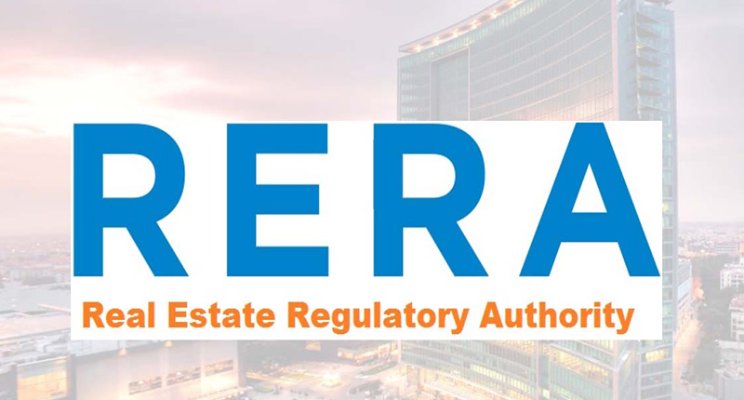- Home
- Business Registrations
Tax Registrations
Other Registrations
Safeguard Registrations
Other Registrations
Safeguard Registrations
- Compliance Services
Labour Laws Compliances
- DSC
- Incentives
- Business Closure
- Other Services
- Blogs
An overview
Real Estate Regulatory Authority named as RERA is introduced with the aim of streamlining the process of the Real Estate Industry. The provisions laid down under the RERA are governed by the RERA Act, 2016.The Real Estate Act makes it mandatory for each state to form its own regulator and frame the rules that will govern the functioning of this Act. It addresses the issues faced by the home buyers.RERA helps in flow of information between the sellers and buyers where the buyer can know the stage of construction, the date till which they get the possession and seller will get how much amount of money at the initial stage etc. RERA protects the interest of the buyers along with the responsibility of sellers and reduces the overall chances of fraud



⇒ Mandatory Registration of Real Estate Projectby Promoter
Evert Real Estate Project must be registered under the respective State’s RERA if the total area to be developed exceeds 500 sq metersOR the number of proposed apartments in all phases is more than 8 apartments. Then every promoter mandatorily obtains the RERA Registration.
⇒Mandatory Registration for Real Estate Agent
Every Agent who is involved in the buying and selling of properties in the Real Estate Industry mandatorily need to register himself under the RERA as the Real Estate Agent.
⇒Levy of Penalty on Promoter
If any Promoter fails to register the project before advertising and promoting the project under the RERA Act, then the Promoter may be charged with a penalty of 10% of the Estimated cost of the project. Further the promoter may be imprisoned for up to 3 years or charged with a fine which may be 20% of the estimated cost of the project.
⇒Levy of Penalty on Real Estate Agent
If any Real Estate Agent fails to register himself under the RERA Act, then the agent will be charged with a penalty of Rs 10,000 per day till the default continues. Further, it may extend up to 5% of the cost of plot, apartment or buildings of the real estate project.
⇒Financing by Financial Institutions/Banks
Buyers usually apply for loans while purchasing the property under the Real Estate Project. While sanctioning the loan, if the bank gets to know the project is not registered under the RERA then they cancel the sanctioning of the loan as such lending will involve high risk factors and uncertainties regarding the completion of the project.
*Definitions*
Every promoter shall make an application to the Real Estate Regulatory Authority for registration of the Real Estate Project whose area to be developed exceeds 500 sq meters OR the number of proposed apartments in all phases is more than 8 apartments. The application shall be made with details disclosures along with the requisite documents.
Every Real Estate Agent shall register himself under the RERA before entering into any transaction by filing an application in the prescribed form to the Real Estate Regulatory Authority. The brief details shall be given in the application along with the requisite documents.
![]()
Timely Possession of the Property
If the Promoter is registered under the RERA Act, then they have to provide the estimated date of completion of project. If they fail to complete the project by the date due to negligence then it will lead to imposition of huge penalties on the Promoter and therefore Promoter will timely complete the project and which ultimately lead to timely possession of the property to the buyers.
![]() Detailed Disclosure of Projects and Activities Involved
Detailed Disclosure of Projects and Activities Involved
If the Project is registered under the RERA, it will help the buyers in obtaining the proper details of the project as the Promoter have to provide the complete and accurate details of the project which cannot be altered later on.
![]() Buyer Preference due to Trustworthiness
Buyer Preference due to Trustworthiness
Buyers always prefer to deal with the promoters who are registered under the RERA. RERA helps in enhancing the trustworthiness towards promoters and real estate agents.
![]() Reduce the chances of Fraud
Reduce the chances of Fraud
Many provisions have been laid down under the RERA Act and the Promoter has to comply with all the compliances which will reduce the chances of fraud.
![]() Financing by Financial Institutions/Banks
Financing by Financial Institutions/Banks
Buyers usually apply for loans while purchasing the property under the Real Estate Project. While sanctioning the loan, if the bank gets to know the project is not registered under the RERA then they cancel the sanctioning of the loan as such lending will involve high risk factors and uncertainties regarding the completion of the project. Hence Banks have also been insisting upon the registration of the Project under the RERA in order to protect their interest.

Among all, the first step involved for the process of company incorporation is ascertaining the availability of name. A company is identified through its name it registered on the Ministry of Corporate Affairs. Hence choosing an appropriate name is the important and crucial thing.
For the same, an application will be submitted for the reservation of name to the Ministry of Corporate Affairsby login to the sitehttps://www.mca.gov.in/mcafoportal/login.do and preference wise 2 names along with the business objective can be provided. Once the name gets approved, it’s reserved for 20 days within which applicant needs to complete all the remaining process for the incorporation of the Company.
Stakeholders shall ensure that the proposed name selected does not contain any word as prohibited in Section 4(2) & (3) of the Companies Act, 2013 read with Rule 8 of the Companies (Incorporation) Rules, 2014.Points to be considered while suggesting the name:
-Check Trademark for your proposed name on the site https://ipindiaonline.gov.in/tmrpublicsearch/frmmain.aspx
– Check domain for your proposed name on the site https://www.registry.in/index
-Check the availability of Company Name on the site https://www.mca.gov.in/mcafoportal/viewCompanyMasterData.do
Therefore, choosing an appropriate name which does not prohibit any law will be the most important thing.
There is also another way to finalize the name of company and its incorporation in one go i.e., apply name and company incorporation together. However, if the same has been rejected by the MCA, then all the documentation will be done again
Once the name gets approved in PART A, the basic details will be automatically filled in all linked forms of PART B. There will be total 4 linked forms which will be generated such as AGILE-PRO, Spice+ MOA, Spice + AOA and INC-9. These linked forms will be filled up with the necessary details like capital subscription, name of shareholders and directors, percentage of holding among the shareholders, Interest of shareholders in other entities, etc.
For completion of the Part B, many other details and documents will be required which is discussed as below:
For the E-filing of all the forms, Digital Signature is a mandatory requirement. Digital Signature is in form of digital key containing all the information about the registered signatory like name, address, Contact No, Email ID and the authority detail which has provided the certificate. All the forms will signed digitally by the authorized signatory by proving its identity through the Digital Signature Certificates.
Director Identification Number is a unique identification number of 8 digits for the directors of a Registered Company.Every director will be provided a unique number with which he will be identified by the MCA. To become a director, one shall apply for getting the DIN from the MCA.To applying DIN, the applicant has to make an application in e-Form DIR-3 and shall follow the below mentioned process
This form is for GSTIN, Employees Provident Fund Organization registration, Profession Tax Registration, Opening of Bank Accounts, Shops and Establishment registration.
It is mandatory to register for ESIC, EPFO, Professional Tax (for Maharashtra) and bank account opening to obtain AGILE-PRO via e-form, However, GSTIN Registration is optional for the applicants.
MOA is a document which contains all the fundamental information about the company, the objectives of the company in brief, the share capital, type of Shares whether equity or preference and its shareholders details, details of allocation of shares among the shareholders along with their name, address and occupation, etc. Company can perform and undertake only those activities that are mentioned in the objectives of Memorandum of Association beyond which the company cannot undertake any other objective but the Memorandum of Association (MOA) can be amended with the approval of the shareholders.
As per Section 4 of the Companies Act, 2013, Companies shall form MOA as specified in Tables A to E of Schedule -I of the Act. Below is the list of tables with their meaning:
Table A: Company Limited by shares
Table B: Company limited by guarantee and not having a share capital
Table C: Company limited by guarantee and having a share capital
Table D: Unlimited Company and not having share capital
Table E: Unlimited Company and having share capital
Hence Company shall adopt an appropriate table applicable to it as there are various forms of tables for different companies.
AOA defines the rules and regulations that govern the internal management of the company for achieving its objectives.
Various forms in Tables F to J for different companies have been mentioned under Schedule I of the Companies Act 2013 and AOA must be in the respective form.
Table A: Company Limited by shares
Table B: Company limited by guarantee and having a share capital
Table C: Company limited by guarantee and not having a share capital
Table D: Unlimited Company and having share capital
Table E: Unlimited Company and not having share capital
Declaration shall be given by the subscribers and directors in the form INC-9 that:
Once all the above documents and details are ready, then the application for the incorporation of the company can be made via e-form Spice accompanied by Spice MOA and Spice AOA with the registrar under whose jurisdiction the address of the company is located. All these e-forms need to be affixed by the Digital Signatures of the respective persons.
The Registrar of Companies will grant a Certification of Incorporation along with the Copy of PAN, TAN, EPF, ESIC which will be used as for the identity of the company existence.
Once the company gets incorporated then there are many compliances which need to be performed by the company
The Company within thirty days of its incorporation shall furnish to the Registrar of Company regarding verification of its registered office by filing the e-form INC-22.
INC-22 shall be downloaded from the Ministry of Corporate Affairs site and any of the following document will be attached with this form:
Every Company incorporated shall within 180 days of its incorporation shall file the declaration for the Commencement of the Business with the Registrar of Company. It is the declaration regarding that all the subscribers to the MOA have deposited the total value of the shares agreed to be taken by them in the Company Bank Account. Proof for the same shall be attached while filing the form INC-20A. Bank Statement shall be used as the evidence for the same.
COMPLIANCESPRO has a separate team which is expert in completing this complex process very easily and helps you to get the company registered within 3 daysonly in a very reasonable price.


We are an organized team of experienced CA, CS and Lawyers, duly supported by a pool of trained staff helping aspiring Entrepreneurs throughout India and providing professional services at the most reasonable fee with complete transparency and helping them to grow by taking their whole burden of all kinds of compliances so that they can focus on their business only.
We are an organized team of experienced CA, CS and Lawyers, duly supported by a pool of trained staff helping aspiring Entrepreneurs throughout India and providing professional services at the most reasonable fee with complete transparency and helping them to grow by taking their whole burden of all kinds of compliances so that they can focus on their business only.
©2022. Compliances Pro. All Rights Reserved.